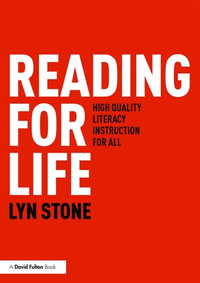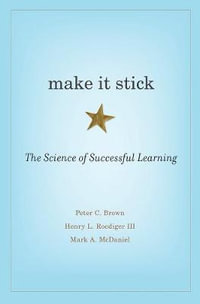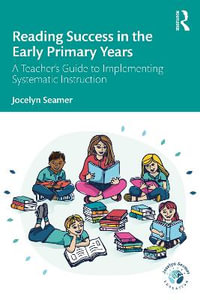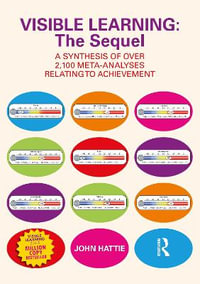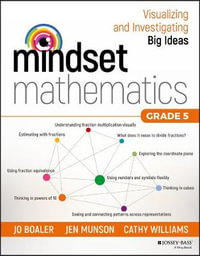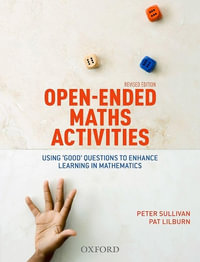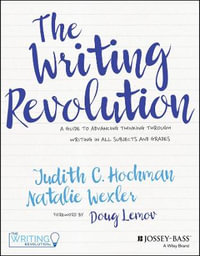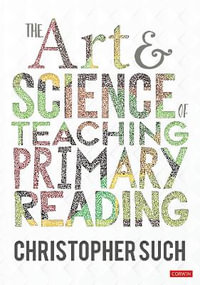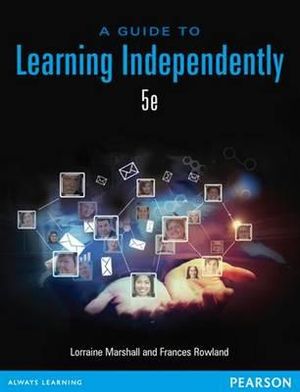
A Guide to Learning Independently
5th Edition
By: Lorraine Marshall, Frances Rowland
Paperback | 16 September 2013 | Edition Number 5
At a Glance
352 Pages
23 x 16.5 x 2
Paperback
RRP $94.55
$79.75
16%OFF
or 4 interest-free payments of $19.94 with
or<br/ The text rests on the premise that it is possible for a person to change the way they approach their learning. It is directed to the individual student because it is the individual who must write the essays and reports, pass the exams and organise themselves in order to be successful in the tertiary education system.
<br/ As well as offering realistic and well-tested study strategies, this Guide focuses on your reasons for study as you balance the demands of study with the rest of your life. It will help you clarify your particular strengths as a learner and develop a repertoire of independent lifelong learning skills. The comprehensive range of study techniques.
1 You
Your physical and emotional self
Body rhythms
Sleep
Food and drink
Physical exercise
Senses
Health and wellbeing
Tension and relaxation
Emotions
Reflections
Your cultural self
Ways of thinking and learning
Beliefs and values
Your goals
Your social self
The people in your life
Social groupings
Your virtual social self
2 Becoming a university student
What to expect from university
University culture
University disciplines
The people
Common images of university
Paying fees
Making choices and decisions
Why are you studying?
Where to study?
University
TAFE
Private institutions
What to study?
Which units?
Which mode of study?
Which teachers?
Which technology?
Getting started
The university year
Orientation
The first weeks
3 Engaging with university
Focusing on your goals and aims
Engaging with others
Getting to know other students
Approaching teachers
Engaging with study
Developing skills and attitudes
Critical thinking
Problem solving
Researching
Collaborative learning
Using learning outcomes to guide your study
Adjusting to being a student
Coping with personal change
Combining study with other work
Seeking help from others
Dealing with difficult situations
Deferring or withdrawing from study
Staying focused on your goals
4 Planning your study
Why plan your time?
When to study
A semester overview (1-7)
A workable weekly plan (1-4)
A quick reality check of your week
Tracking your use of time
Weekly priorities
Sticking to a plan
Procrastination
How to study
Knowing what works for you
Focusing
From flicking to focusing
Focusing for a sustained time
Creating brainspace
Concentrating
Warming up (1-5)
Sustaining concentration
Losing concentration
Where you study
Location
Study spots
Comfort
5 Learning and remembering
Filters on what you learn and remember
Why remember?
How you learn to remember
What is important to you
When you are ready
A way that suits you
Building on what you already know
Suspending previous knowledge and beliefs
Selecting what to learn
Learning thoroughly
Different ways for the same material
Patterns and principles
Before, during and after classes and study
Study session techniques
Memory keys
Transferring and using what you learn
Exams
6 Asking your own questions
What questions might you ask?
Why do I want to know?
What do I want to know?
How do I know that …?
Why?
When? Where? How? Who? What?
What happens when …?
What if …?
Pursuing your questions in formal education
Independent study
7 Choosing and analysing a topic
Purposes for assignments
Your aims
Learning outcomes and teachers’ objectives
Expectations of assignments
Tertiary study
Disciplines
Genres
Individual teachers
Topics and questions
Choosing a topic
Personal opinions
Analysing a topic and developing a research question
1 What is the topic about?
2 What do I already know about the topic?
3 How much breadth or depth can this essay have?
4 What might my thesis or theme be?
5 What are the possible main points?
6 Which sources might I use?
7 How might I structure my response to the topic?
8 What role might my personal opinions play?
9 What is my initial research question?
Your initial working definition
8 Researching a topic
The initial stages
1 Practical considerations
Time available
Download, print, copy, borrow or buy?
2 Selecting likely material
a Devising a reference list
b Key terms
c Finding extra sources
d Recording and filing references
e The medium
f Searching the Internet
g Developing your research question
3 Evaluating your selection
Previewing selected material
Evaluating web pages
Working with selected material
Questioning and critiquing
Integrating your ideas with information
Communicating your ideas
Towards the end of your research
Your revised definition
9 Using information sources
Starting points
Unit materials
Libraries
Information and learning spaces
Types of collections
Discovering useful resources
Guides and support
Searching for and retrieving information
Off-campus access
The Internet
Search engines
Net neutrality?
Information literacy
University-level Internet
Skills needed
Using sources effectively
The mass media
Primary and secondary sources
Quantitative and qualitative sources
Research: a complex process
10 Reading
Preparing to read
Your purposes
Examining your material
Previewing
a Why preview?
b Previewing a book chapter or journal article
c Previewing online text
d Complexity of material
e The discipline area
Developing your vocabulary
As you read
Approaches to reading
1 Entertainment reading
2 Overview reading
3 Reading for specific information
4 Reading for an argument or theme
5 Reading for an in-depth understanding
6 Reading to question and critique
Reading rates
Notemaking and/or underlining
Why make notes or underline?
What to note or underline
How much to note or underline
How to make notes or underline
After you read
Reviewing the chapter
11 Listening to lectures
Why lectures?
Preparing for a lecture
As you listen
Making notes
Overcoming concentration difficulties
After a lecture
12 Participating in discussions
Why discussion groups?
Types of discussion groups
Collaborative learning groups
Setting up discussion groups
First things
Group size
When and where to meet
The first few meetings
Getting to know each other
The group’s role and focus
Ongoing meetings
Attending meetings
Ground rules
Preparing for a discussion
Playing your part during discussions
Talking and listening skills
Online discussions
Taking responsibility
Leading and monitoring a group
Presentations
The teacher’s authority in a group
Leadership styles
Coping with a teacher’s authority
After a group
13 Developing your writing
The process of writing
Creating
Editing
Write often and reflectively
Experiment with different methods
Free writing
Structured writing
Write in different genres
Letters, articles, poems and other forms
Personal journals or diaries
What is a journal
A format
Learning journals or logs
Blogs
Share your writing
Writing groups
Why join a writing group?
Setting up a writing group
14 Writing essays
Before you begin writing
Your definition of the topic
Your readers
Writing your rough draft
Writing methods
Writing to a plan
Free writing
Other writing methods
The parts of your essay
The introduction
The body of your essay
a Ordering the main points
b Linking information
c Presenting each main point fully and accurately
d Paragraphing
e Balancing main points
The conclusion
Working with your rough draft
Editing your final draft
Evaluating your essay
15 Writing scientific reports
Beginning a report
Writing as you plan
Your laboratory or field notebook
Measurements, observations and calculations
Planning your writing
As you write your report
Report sections
1 The title
2 The abstract or synopsis
3 The introduction
4 The materials and methods
5 The results
6 The discussion
7 The conclusions
8 The references
Data presentation
Why use tables or figures?
How will you present data?
Ordering data in tables
Writing styles and conventions
Style
Conventions
Editing the report
Questions and mistakes
16 Using conventions
Academic integrity
Plagiarism and collusion
How to avoid plagiarising
Quoting, paraphrasing and summarising
Why use quotations?
How to present quotations
Long quotations
Short quotations
All quotations
Paraphrasing and summarising
References
Why include references?
When to reference
How to reference
Author-date references
Footnotes
Endnotes
Reference lists and bibliographies
Reference lists
Bibliographies
How to present a reference list and bibliography
Book entry
Article, chapter or anthology item
Additional points
The finishing touches
Grammar, spelling and punctuation
Presentation
17 Learning from evaluation
Why evaluation?
Your aims
Other people’s objectives
Who evaluates your learning?
How is your learning evaluated?
Your own evaluation
Peer evaluation
Teachers’ evaluations
Formative evaluation
Summative assessment
Criteria and standards
Administrative requirements
A learning portfolio
Appendix
Discrimination: sexist language and attitudes
Avoiding sexist language
Avoiding sexist attitudes
Quotation sources
Index
ISBN: 9781442559363
ISBN-10: 1442559365
Published: 16th September 2013
Format: Paperback
Language: English
Number of Pages: 352
Audience: College, Tertiary and University
Publisher: Pearson Education
Country of Publication: AU
Edition Number: 5
Dimensions (cm): 23 x 16.5 x 2
Weight (kg): 0.6
Shipping
| Standard Shipping | Express Shipping | |
|---|---|---|
| Metro postcodes: | $9.99 | $14.95 |
| Regional postcodes: | $9.99 | $14.95 |
| Rural postcodes: | $9.99 | $14.95 |
How to return your order
At Booktopia, we offer hassle-free returns in accordance with our returns policy. If you wish to return an item, please get in touch with Booktopia Customer Care.
Additional postage charges may be applicable.
Defective items
If there is a problem with any of the items received for your order then the Booktopia Customer Care team is ready to assist you.
For more info please visit our Help Centre.


